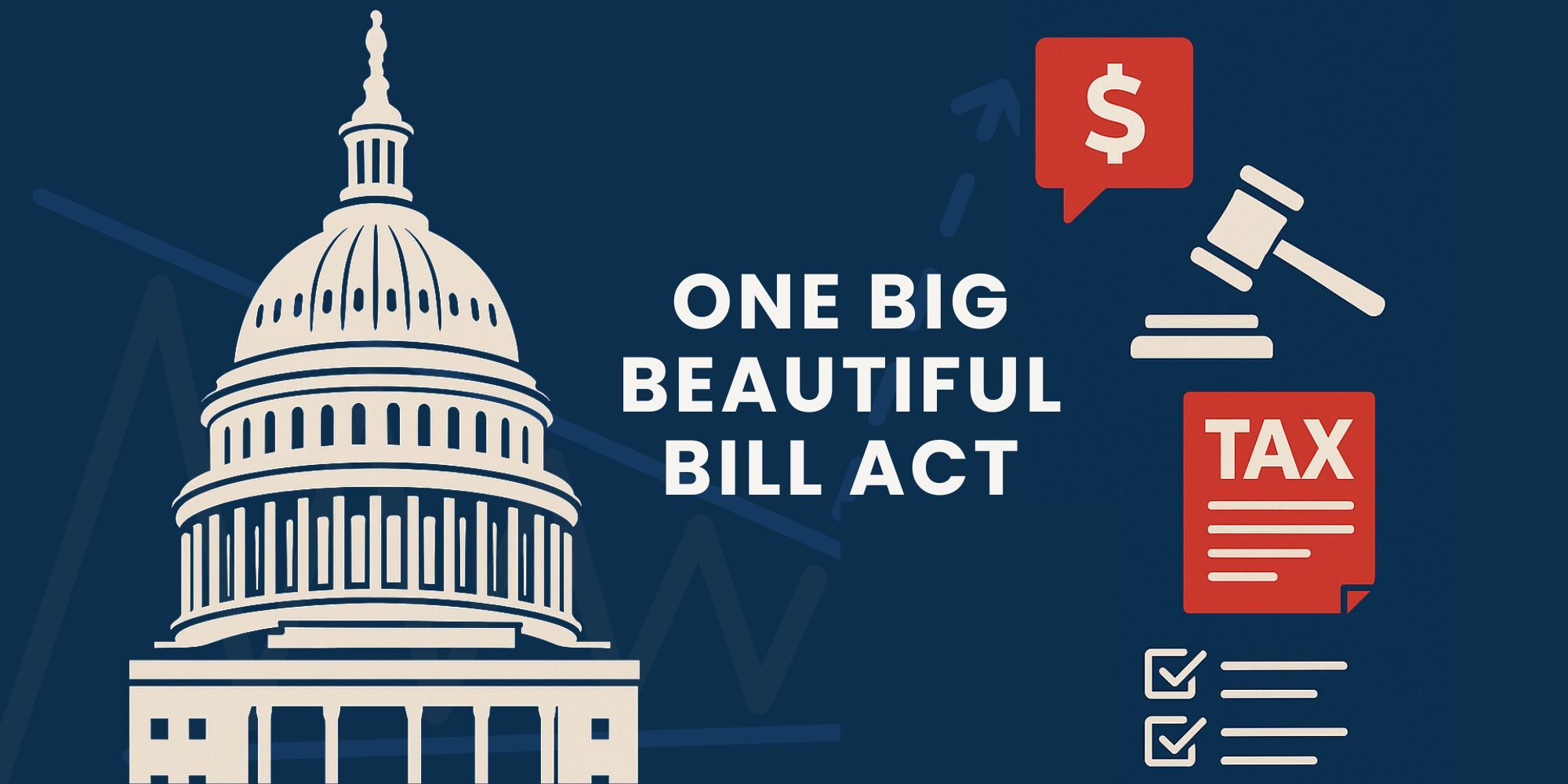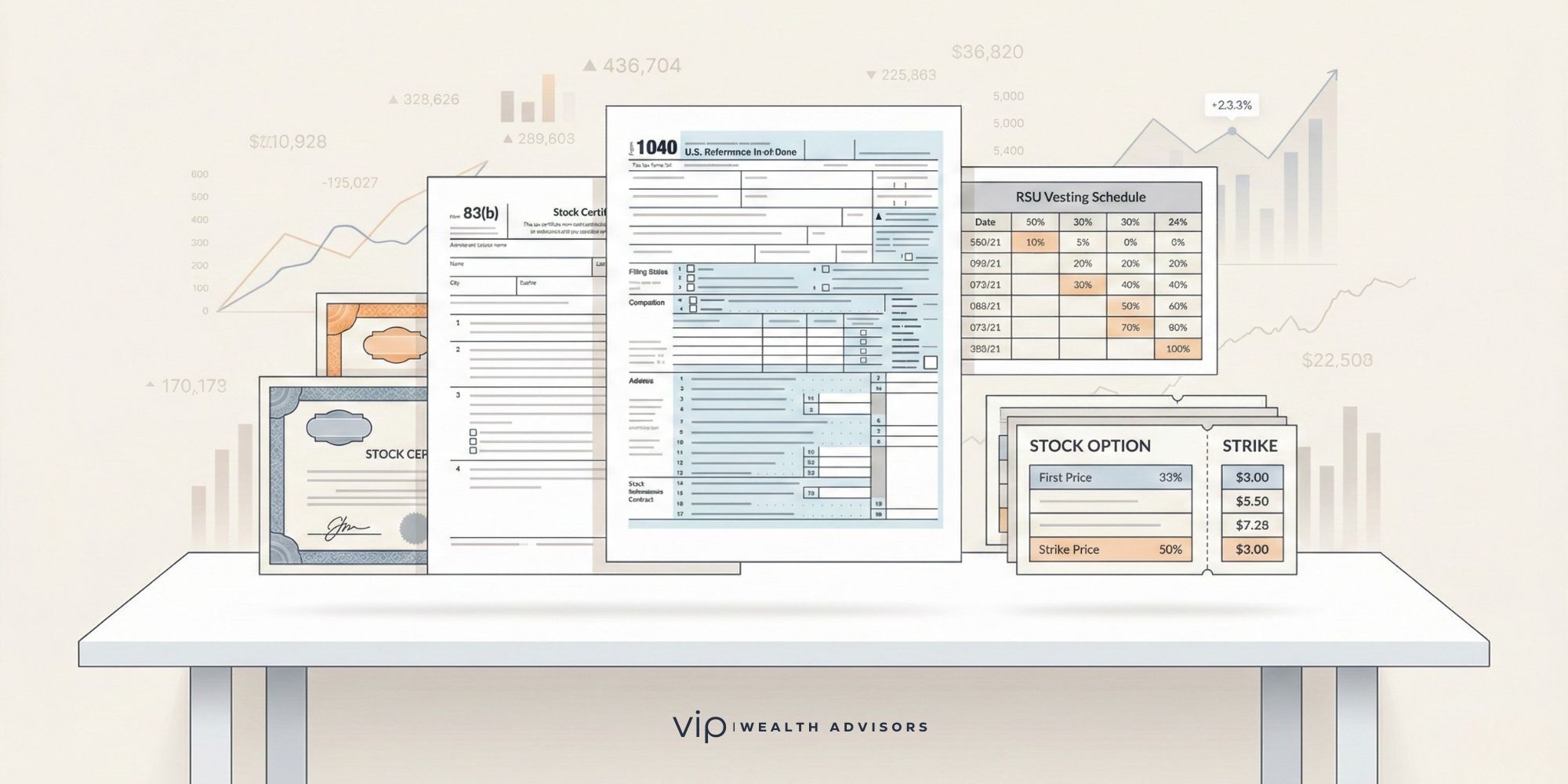The Senate's "Big, Beautiful Bill" Just Passed - Here's What It Means for Affluent Taxpayers
In a move poised to reshape the U.S. tax landscape for years to come, the Senate just moved forward its 940-page version of President Trump's sweeping economic and tax legislation - nicknamed the "One Big Beautiful Bill." While media headlines focus on partisan theatrics, VIP clients like you need clear insight into what's inside the bill, what's changing, and how it affects your financial plan.
At VIP Wealth Advisors, we specialize in navigating legislation like this with precision, so here's your detailed breakdown, plus commentary on what we're watching next.
🔑 Key Takeaways at a Glance
| Category | Senate Bill Highlights | What It Means for You |
|---|---|---|
| Taxes | The 2017 Trump tax cuts made permanent | Your rates stay lower, but planning around phaseouts & deductions still matters |
| SALT Cap | Increased to $40,000 (temporary) | More deduction flexibility, especially for high-tax states |
| Child Tax Credit | $2,200 per child, phased out at higher income levels | Less relevant for ultra-high earners, but worth coordinating if phased eligibility applies |
| Medicaid & ACA Changes | Work requirements, reduced subsidies | Could impact portfolio companies, hospital investments, and household staff coverage planning |
| Green Energy Incentives | Phased out by 2027 | EV tax credits and solar incentives ending—act now if you want them |
| Business Taxes | Immediate expensing and pass-through relief made permanent | Major win for LLC/S-corp owners—we’ll help model the impact |
📜 Tax Cuts Permanently Extended - But There's a Catch
The core of this bill solidifies the individual income tax rate reductions implemented in the 2017 Tax Cuts and Jobs Act. Marginal tax brackets remain compressed, meaning that most households will retain their reduced tax obligations; however, inflation indexing may erode some of the benefit over time.
VIP Insight:
While permanent tax cuts sound great, high-income taxpayers must still contend with:
- Phaseouts of deductions and credits
- The Net Investment Income Tax (NIIT) and AMT, which remain untouched
- Sunset of other favorable provisions not included in this version
We're already running new 2026–2030 tax projection scenarios for clients to see how the "permanent" cuts interact with complex income and asset structures.
🧂 SALT Cap Raised (Temporarily)
One of the most headline-grabbing elements: The State and Local Tax (SALT) deduction cap jumps from $10,000 to $40,000 for married couples, though only through 2029.
This is especially relevant for clients living in:
- California
- New York
- New Jersey
- Illinois
VIP Insight:
Itemizing deductions is back in style - we'll evaluate whether you benefit from strategic lumping (e.g., prepaying property taxes or stacking charitable giving).
You may be able to front-load 529 contributions, donor-advised funds, and mortgage interest strategies now that the cap has expanded.
👶 Child Tax Credit: Modestly Changed
The Senate version proposes a $2,200 per child tax credit, which is slightly less generous than the House's $2,500 version. Phaseouts begin at $400,000 for married couples.
VIP Insight:
For most of our clients, you're phased out entirely - but this is a good reminder to evaluate multigenerational planning techniques, such as gifting to irrevocable trusts for kids and grandkids.
If you're on the margin of eligibility due to RSU income or K-1 distributions, we may explore tax bracket smoothing strategies.
🧾 Charitable Giving: More Tools to Work With
The bill enhances the above-the-line deduction for non-itemizers and increases the AGI limit for cash donations.
VIP Insight:
If you're charitably inclined, this is your green light for DAFs, CRTs, and stacked contributions.
We're pairing this with qualified appreciated stock donations and planned giving strategies to maximize your impact and minimize your AGI. Learn more about our tax planning strategies.
🚘 Green Energy Incentives Slashed - Time-Sensitive Planning Alert
The bill proposes the repeal of EV tax credits, solar tax credits, and other green incentives, effective in 2027.
VIP Insight:
If you've been delaying that EV or solar panel install, don't wait.
Business owners with green energy credits or depreciation play should reassess capital expenditures now.
🏥 Healthcare Overhaul: Medicaid, ACA, and Hidden Implications
The bill introduces strict work requirements for Medicaid, slashes subsidies, and makes state-administered flexibility the default.
VIP Insight:
While this doesn't directly impact most of our clients' coverage, it could:
- Affect household employees who rely on the ACA or Medicaid
- Reshape your investments in healthcare REITs, rural hospitals, or private equity healthcare portfolios
- Drive up premiums in the individual market, which could affect family members or younger dependents
We're monitoring implications across portfolio companies, small business group plans, and long-term care planning.
🧾 Business Owner Wins: 100% Expensing and Pass-Through Tax Relief
For our clients who own businesses or receive income through pass-through entities (LLCs, S-corps), the bill:
- Makes Section 199A permanent
- Reinstates 100% bonus depreciation on capital expenditures
- Simplifies QBI phaseouts for professionals in key industries
VIP Insight:
This creates massive opportunities for:
- Strategic capital investment before year-end
- Accelerated depreciation of real estate, machinery, and technology purchases
- Tax arbitrage for multi-entity families
Let's model how this interacts with your defined benefit plan, entity structure, and income-timing strategies.
🧮 National Debt & Deficit: Should You Be Concerned?
The bill is expected to add $3-$5 trillion to the deficit over the next 10 years, depending on the economic growth assumptions.
While markets may absorb the increase for now, we are watching for:
- Interest rate shifts
- Pressure on the Fed
- Future entitlement reform proposals
VIP Insight:
This is a critical reason to ensure your estate plan and long-term income plan are flexible. Tax environments change. Your plan must adapt.
🗳️ What's Next?
The Senate's bill now heads toward reconciliation with the House version, where differences over the SALT cap, child tax credit, and green energy rollbacks will be negotiated.
We expect a final version before the July 4 recess, with implementation beginning in 2026 for most provisions.
💼 VIP Wealth Game Plan
Here's how we're responding for our client base:
✅ Running updated multi-year tax projections✅ Reassessing SALT optimization and itemizing strategies
✅ Exploring accelerated depreciation and pass-through relief for business owners
✅ Reviewing green energy, estate tax, and charitable giving timelines
✅ Modeling future tax risks (especially in 2027-2030)
Final Thoughts
This bill isn't just about politics; it's about planning. Whether you're a technology executive with ISOs, a small business owner with pass-through income, or a retiree focused on tax efficiency, this legislation will shape your financial reality for years to come.
At VIP Wealth Advisors, our proactive planning lens helps you anticipate, not just react. Let's ensure your strategy reflects the latest developments.
View More Articles by Topic
- Taxes (81)
- Financial Planning (46)
- Equity Compensation (38)
- Investments (30)
- RSU (23)
- Tax Policy & Legislation (19)
- Business Owner Planning (17)
- Incentive Stock Options (16)
- Retirement (16)
- Psychology of Money (15)
- Alternative Investments (13)
- AMT (9)
- Pre-IPO Planning (9)
- Real Estate (9)
- Estate Planning (8)
- Fiduciary Standard (8)
- Crypto (6)
- NSOs (6)
- The Boring Investment Strategy (6)
- Capital Gains Tax (5)
- Private Investments (5)
- QSBS (5)
- Market Insights (4)
- Post-IPO Tax Strategy (4)
- 401(k) Strategy (3)
- Market Timing (3)
- Q&A (3)
- Stock Market (3)
- Venture Capital (3)
- Altruist (2)
- Charitable Giving (2)
- ETF Taxes (2)
- IRA Strategy (2)
- International Financial Strategies (2)
- Irrevocable Trust (2)
- Legacy Wealth (2)
- Video (2)
- AUM vs Flat Fee (1)
- Atlanta (1)
- Book Review (1)
- Carried Interest Planning (1)
- Depreciation & Deductions (1)
- Education Planning (1)
- Energy Markets (1)
- Precious Metals (1)
- QTIP Trust (1)
- Revocable Trust (1)
- Risk Management (1)
- Schwab (1)
- Solo 401k (1)








